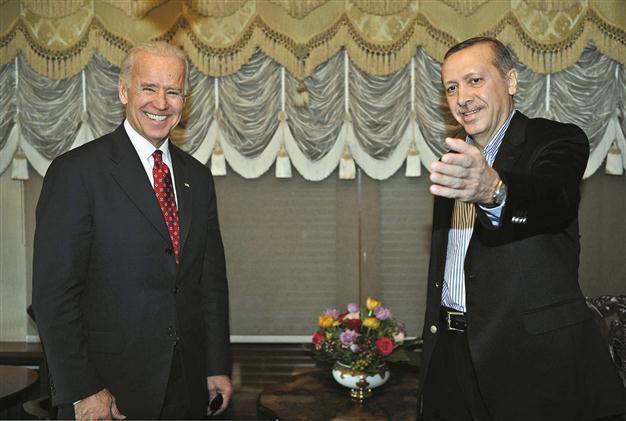‘Israel knows what to do to normalize ties’
ISTANBUL- Hürriyet Daily News

Turkish Prime Minister Erdoğan (R) makes his first appearance a week after surgery during a meeting with US Vice President Biden. Biden raised the Israeli apology issue during talks with top Turkish
officials. AA photo
Israel is well aware of what it must do to decrease tension with Turkey, Turkish officials have told the visiting U.S. vice president, referring to a demand that Israel apologize for killing nine Turkish aid activists last year.
“We told the Americans they could go and talk to the Israeli government,” one Turkish official told the Hürriyet Daily News on Dec. 3. “Israel knows what to do.”
U.S. Vice President Joe Biden raised the issue during talks with top Turkish officials. They told Biden, who said the U.S. wanted to work with Turkey on a number of conceivable subjects, that Turkey did not want poor ties with Israel, thus outlined the steps needed to normalize ties.
Perhaps one of the most interesting parts of U.S. Vice President Joe Biden’s visit to Turkey was while he was crossing the Bosporus Bridge, connecting the European and Asian sides of Istanbul, to pay a ”get well soon” visit to Turkish Prime Minister Recep Tayyip Erdoğan at his home.
Enjoying the Bosporus view underneath with a speed of around 10 kilometers per hour, he did possibly not get the goodwill wishes from all those driving in Saturday lunchtime traffic of the city inhabited by 14 million people. But, it was received as a goodwill gesture to show the value given to the Turkish PM.
Thanks to Biden’s two-hour visit, Turks had the chance to see the first two photographs of Erdoğan since his surgery on Nov. 25; he might stay in bed for another week.
Biden himself is not known by Turkish diplomats and politicians as one of the biggest fans of Turkey; but as a VP who declared he would not put his candidacy forward again, his statements during his two-day Turkey visit were like music to their ears.
Emphasizing that Turkey, with its secular democracy in a predominantly Muslim population and open economy, could be an example for those Muslim populations in transformation, Biden represented President Barack Obama in the second of a Global Entrepreneurship Summit in Istanbul; the first one was in Washington DC last year under the auspices of Obama.
Only the part wishing improvement of Turkish-Israeli ties caused limited controversy in Biden’s speech in the summit. Because since the Mavi Marmara flotilla incident, when Israeli soldiers killed nine Turkish citizens trying to defy embargo on Gaza strip, the relations have dipped and Ankara demands an open apology with compensation to the families of those killed.
According to diplomatic sources, the issue was raised by Biden briefly in his talks with President Abdullah Gül, Parliamentary Speaker Cemil Çiçek and PM Erdoğan. When Biden said the U.S. wanted to work with Turkey on a number of conceivable subjects - not limited to the Arab Spring issues - and Turkey’s efforts to have a better profile in the U.S. Congress, where Israeli, Greek and Armenian lobbies were active, he got a similar reply from his counterparts. Ankara told Washington that Turkey did not want relations with Israel to hit rock-bottom like this; it wanted normalization and told Israel what is needed for that.
“We told the Americans they could go and talk to the Israeli government,” one Turkish official, who did not want to be named, told the Hürriyet Daily News. “Israel knows what to do.”
Ankara expects Biden to share this stance with U.S. Secretary of Defense Leon Panetta before his visit to Turkey, planned for January 2012. Panetta recently told Israel to find a way to normalize its relations with Turkey, Egypt and Jordan in order to break the isolation surrounding it and sit at the “damned” table with Palestinians.
The Israeli government is disturbed by the election results in Egypt, where Islamist parties got the majority of the votes. On the other hand, it relies on the election atmosphere in the U.S. in order to buy some more time. That is why Ankara believes it was up to Washington to convince Tel Aviv for an acceptable solution.
